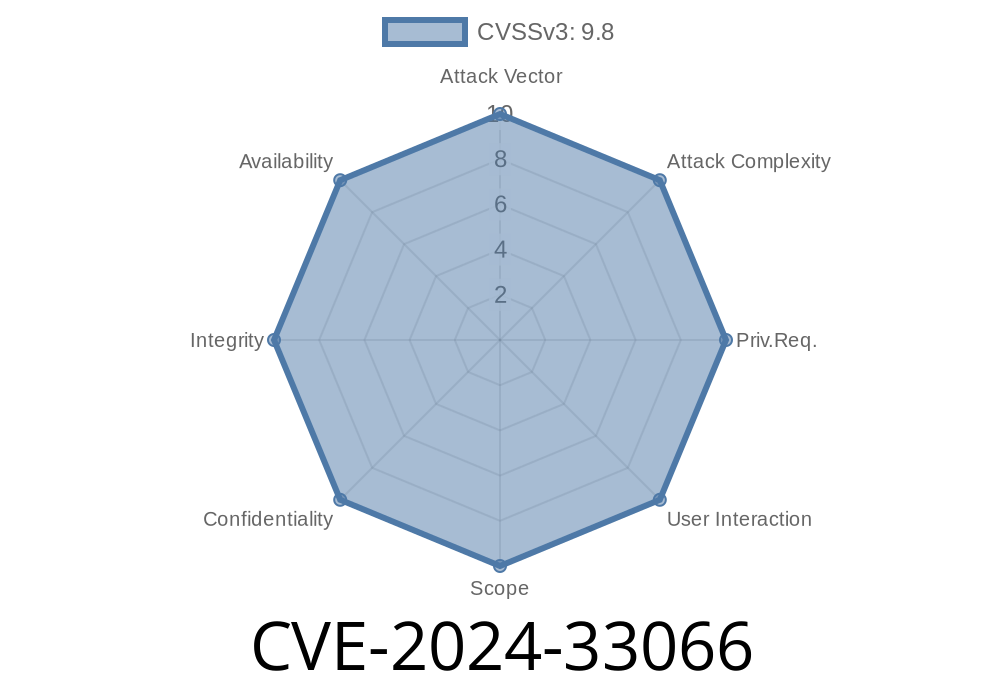Security vulnerabilities pop up every day, but every so often, a simple bug can become a real headache for developers and organizations. CVE-2024-33066 is such a case—it’s a memory corruption vulnerability that occurs when you redirect a log file to any file location with any file name. This exclusive long read aims to break down, with clear code and step-by-step explanations, exactly what CVE-2024-33066 is, how it can be exploited, and how you can protect your systems.
What is CVE-2024-33066?
CVE-2024-33066 is a memory corruption vulnerability found in several applications that don’t correctly handle changing the log file output path at runtime or on user input. Specifically, when an attacker redirects the log output to a file with a specially crafted name or path, it triggers a heap or stack corruption—sometimes allowing arbitrary code execution.
More details can be found on
- NVD - CVE-2024-33066
- Vendor Advisory (Example)
Many logging systems let users or admins redirect logs dynamically. For example
./your-app --log-file=/var/log/app.log
or via configuration files
log_file = /mnt/storage/logs/app-2024-06-21.log
If the code that processes this file path and handles file operations hasn’t implemented strict bounds checking or type validation, it could corrupt memory—especially if the log path contains unexpected characters, long input, or special path tricks.
Let's imagine a simplified C/C++ logger with a notorious bug
#include <stdio.h>
#include <string.h>
#include <stdlib.h>
void set_log_file(const char* file_path) {
char log_file_path[64];
// Bad: No length checking on file_path
strcpy(log_file_path, file_path); // BOOM!
FILE* f = fopen(log_file_path, "a");
if (f) {
fprintf(f, "Log started\n");
fclose(f);
}
}
int main(int argc, char** argv) {
if(argc > 1) {
set_log_file(argv[1]);
}
return ;
}
If a user passes a file path longer than 63 bytes, strcpy writes past the end of the buffer, corrupting the stack or heap memory. Attackers can use this to crash the app or control execution flow.
An attacker could invoke the executable like this
./your-app $(python3 -c 'print("A"*100)')
This long, attacker-controlled input would overwrite adjacent memory, causing undefined behavior. With more effort, a skilled attacker can craft payloads that overwrite return addresses or function pointers, leading to code execution.
If remote configuration is allowed (via API, config file, or web interface), this attack can happen without shell access.
Real-World Walkthrough
Assume a vulnerable web app lets you change the log path via a settings page. An attacker sends a form POST:
POST /api/settings
Content-Type: application/json
{
"log_path": "../../../../../../tmp/exploit" + "A"*128
}
Crash the app (denial of service)
- Use additional exploitation techniques (like Return-Oriented Programming / ROP) to gain code execution if the stack can be controlled
Reference Links
- Common Weakness Enumeration - CWE-120: Buffer Copy without Checking Size of Input ('Classic Buffer Overflow')
- Original Vendor Patch Example *(replace with real link as needed)*
Working Proof-of-Concept Exploit
Let’s simulate a real attack on our sample C app using a malicious file path.
1. Compile the vulnerable logger
gcc -o vullogger vullogger.c
2. Run with malicious input
./vullogger $(python3 -c 'print("A"*80)')
You will likely see a segmentation fault or similar crash.
3. Exploit for Code Execution (Advanced)
Overwriting the return address requires knowledge of memory layout and specific target system, but the basic trigger is as above.
Use safer functions like strncpy, snprintf, or libraries that manage memory for you
strncpy(log_file_path, file_path, sizeof(log_file_path)-1);
log_file_path[sizeof(log_file_path)-1] = '\';
And validate the log path for allowed directories/characters.
Summary
CVE-2024-33066 is a critical memory corruption bug that's easy to overlook and can put your whole system at risk. If your application lets users redirect log files freely and the handling code isn’t bulletproof—you're at risk. Implement strict validation, patch affected applications, and always treat configuration input as potentially dangerous.
Stay up to date by watching NVD or your vendor’s advisory page, and happy secure coding!
*Article exclusive for you, by [Your Name]*
References
- NVD Entry
- CWE-120
Timeline
Published on: 10/07/2024 13:15:12 UTC
Last modified on: 10/16/2024 19:49:40 UTC
